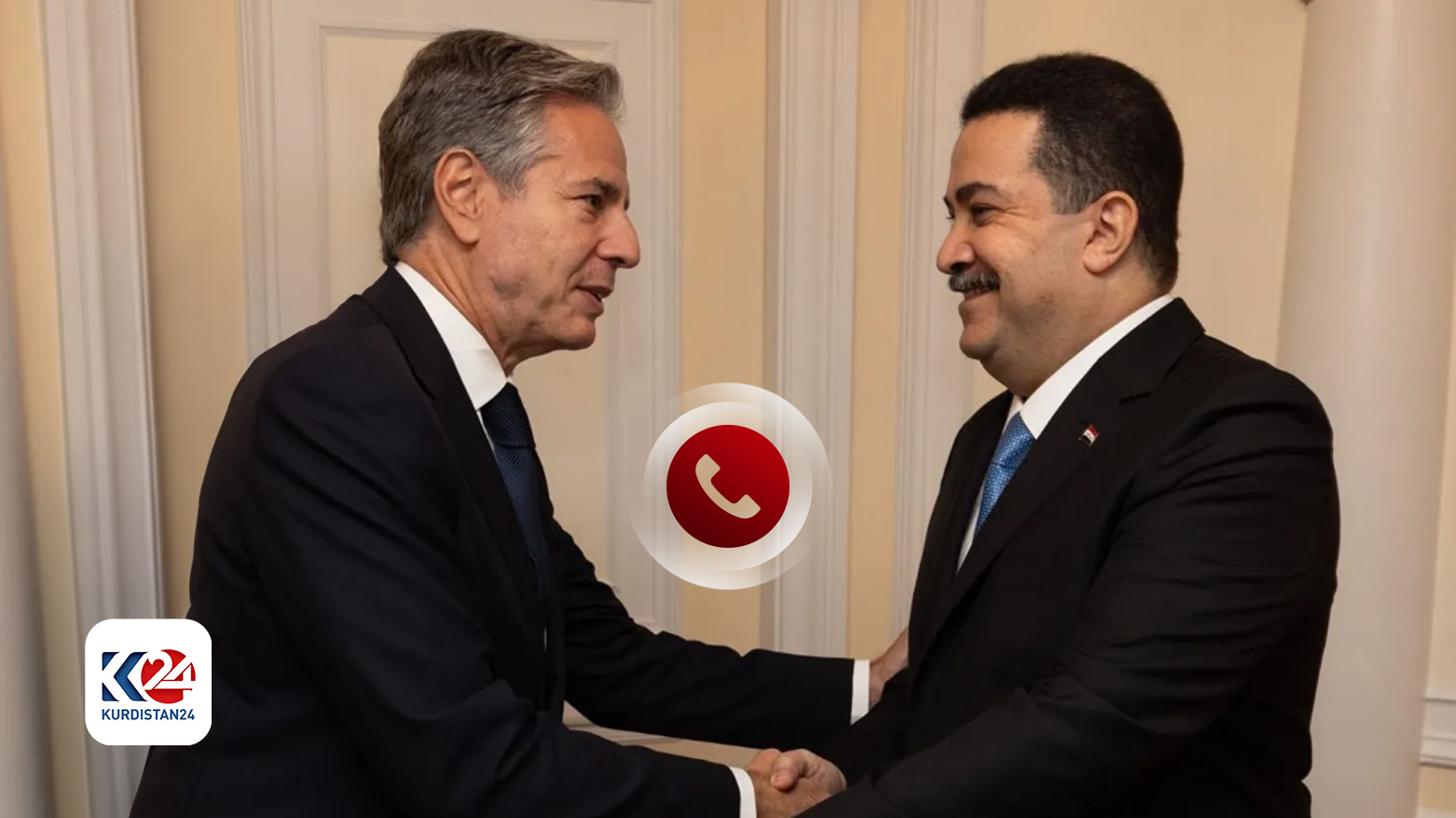Blinken,-Sudani Speak Again Amid Expectations of Iranian Attack on Israel
"The Secretary and the Prime Minister committed to continuing to consult one another on issues in the region and to advance the U.S.-Iraq relationship," the US read-out concluded.

WASHINGTON DC, United States (Kurdistan 24) – For the second time in little more than two weeks, U.S. Secretary of State Antony Blinken spoke by telephone on Monday with Iraqi Prime Minister Mohammed Shi’a al-Sudani.
Both calls came amid heightened tensions between Iran and Israel, following the July 31 assassination of Hamas leader, Ismail Haniyeh, in Tehran. It is widely assumed that Israel was responsible, although it has not acknowledged that.
Monday’s discussion between Blinken and Sudani took place amid a widely held expectation, shared by the U.S. and Israel, that it is “increasingly likely that there will be an attack by Iran and/or its proxies,” as White House spokesman, John Kirby, told journalists on Monday.
Kirby suggested that Iran’s retaliatory attack could occur “perhaps in the coming days.”
U.S. Military Build-Up
As concerns Iraq, a major U.S. concern is that Iranian-backed Shi’a militias in the country, which consider themselves part of the so-called “Axis of Resistance,” do not attack U.S. forces.
Iran has used the conflict between Israel and Hamas, ongoing for over 10 months, since Hamas’s Oct, 10, 2023, lethal cross-border assault into Israel, to mobilize its proxies for action in the region.
It is feared that an escalation of the conflict between Israel and Iran might well entail militia attacks on U.S. forces in Iraq and Syria, particularly if the U.S. military should become involved in defending Israel against Iranian assault.
On Sunday, Secretary of Defense Lloyd Austin ordered the deployment to the region of a second Aircraft Carrier Strike Group: the USS Abraham Lincoln, which is equipped with F-35C Lightning II combat jets, which can each carry up to nine tons of weapons.
The USS Theodore Roosevelt Carrier Strike Group is already operating in the area. Lloyd also ordered a ballistic missile submarine, the USS Georgia, to the area.
U.S. Efforts to Prevent Escalation of Conflict
The Biden administration seeks to prevent a serious Iranian retaliation against Israel, which, it fears, could lead to a broader war in the region.
On Monday morning, as Kirby explained, President Joe Biden spoke with his counterparts from Britain, France, Germany, and Italy to coordinate their efforts in three respects regarding the Middle East crisis: 1) reaffirm their commitment to Israel’s defense; 2) secure a cease-fire between Israel and Hamas; and 3) “send a strong message” against “any rise in violence,” including “any attacks by Iran or its proxies.”
Blinken-Sudani Conversation
In their discussion on Monday, Blinken and Sudani “discussed ongoing efforts to advance stability in the region and the importance of preventing escalation,” according to the U.S. read-out of their exchange.
Blinken also “reiterated the importance of Iraq’s responsibility to protect Coalition military advisors from attacks by Iran-aligned militias.”
Last Monday, an Iranian-backed militia launched several rockets at Ain-al Assad Airbase in Iraq’s western Anbar Province, which hosts U.S. forces. Casualties and damage were minimal.
Subsequently, the Iraqi government arrested five people for the attack, and U.S. officials described its actions as “appropriate,” while affirming, “We have a good partnership with the Iraqi government.”
Read More: US: ”Iranian-Backed Shia Militia Group” behind Ain Al Asad Airbase Attack
Lastly, the U.S. summary of the discussion between Blinken and Sudani concluded, “The Secretary and the Prime Minister committed to continuing to consult one another on issues in the region and to advance the U.S.-Iraq relationship.”
Biden and Sudani also spoke about the Israeli-Iranian confrontation in its early days, on Aug. 4. It was a rare Sunday call for the U.S. Secretary of State.
Read More: U.S. Secretary of State Speaks with Iraqi PM, as Iranian-Israeli Tensions Escalate